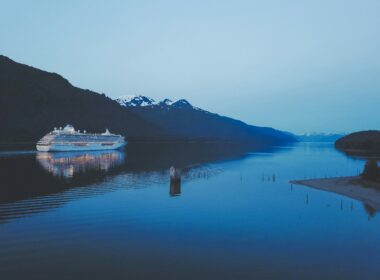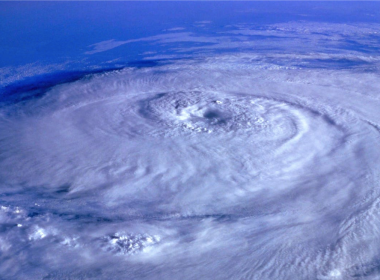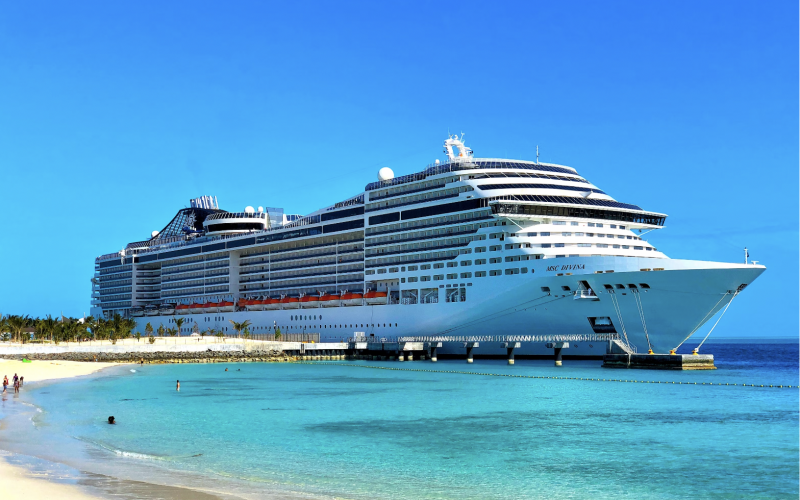Cruise vacations are the perfect opportunity to step outside of your comfort zone, as they allow you to explore new destinations, try your hand at fun activities, and experience a luxurious lifestyle at sea. But in addition to these endless opportunities for adventure, there are many reasons why people avoid booking a cruise vacation.
Whether it be a fear of storms, the open water, or getting sick, there are many common reasons why people develop cruise-related anxieties. In this blog, we’ll break down three of the most common fears related to cruises and provide tips on overcoming them.
How to Conquer Your Fears
Before diving into our tips and tricks for conquering your cruise-related fears, it’s important to remember that it is completely normal and natural to be afraid of cruises. In fact, according to the National Institute of Mental Health, “an estimated 12.5% of U.S. adults experience specific phobia at some time in their lives.” And with these phobias come a number of physical and psychological symptoms that influence how people respond to certain situations.
All this is to say that having a cruise-related phobia is completely normal. If you suspect you have a specific fear of cruise ships, it’s important not to feel guilty, weak, or ashamed. Rest assured you are not alone, and there are plenty of tools at your disposal to help you face your fear in a healthy, supportive way. And while conquering a fear does require a certain level of courage and persistence, the results are well worth the effort.
One last note: if the symptoms of your phobia are getting in the way of you living an everyday, healthy life, seeking help from a medical or mental health professional may be beneficial.
The Fear of Open Water

One of the most common fears related to cruise ships is the fear of open water. In fact, it’s so common that it even has its own name, thalassophobia. People with this phobia experience an unsettling fear of large and deep bodies of water. According to Very Well Mind, “people are not afraid of the water so much as they are afraid of what lurks beneath its surface.”
People with thalassophobia experience a number of symptoms when their fear is triggered, including but not limited to dizziness, nausea, shortness of breath, anxiety, panic attacks, and feelings of imminent doom. Depending on the severity of your symptoms, speaking with a certified mental health counselor may be beneficial to devise a plan for facing and eventually eliminating this fear. Otherwise, you can implement various desensitization methods to help get over this phobia of open water.
Exposure therapy is one of the most common and successful methods, whereby you gradually expose yourself to your triggers to develop more healthy coping strategies. A great approach to conquering thalassophobia regarding cruises is to book a river rather than an ocean cruise. These cruises are typically smaller in size and stay within sight of land for the entire duration of the voyage. This type of itinerary will allow you to experience an authentic cruise vacation while at the same time exposing yourself to your fear of open water.
At the end of the day, mental health professionals agree that conquering one’s fears may not be a simple or straightforward process, but anything is possible with the right tools, techniques, and attitudes.
The Fear of Storms & Bad Weather

Another phobia related to thalassophobia is the fear of encountering storms or other aggressive weather phenomena while onboard a cruise ship. Once again, this is a completely natural fear to have. As humans, we are evolutionarily hardwired to want to protect ourselves from the brutality of Mother Nature. Boarding a ship that could very well get caught up in a tumultuous storm at sea is, for many, asking for trouble.
In order to conquer this fear, it can be helpful to inform yourself of the preparations and protocols cruise lines have in place for effectively navigating tumultuous weather and protecting both crew and passengers onboard.
Before even a single passenger has boarded, all cruise ships are vigorously tested for their ability to handle rough seas. Furthermore, they are specifically engineered to maintain a certain center of gravity and level of buoyancy that gives them the stability necessary to survive hurricane-level wind and waves.
Cruise ships are also equipped with top-of-the-line meteorology technology, allowing the captain and crew to constantly monitor weather patterns and make extraordinarily accurate storm predictions. Some cruise lines, such as Royal Caribbean, have begun hiring onboard cruise meteorologists who can give the captain real-time weather updates and predictions.
All in all, if you have a fear of encountering storms at sea, you can rest assured knowing that the latest technology is hard at work in your favor, with professional teams of meteorologists working diligently to provide ship captains with the information necessary to make the most responsible decisions while out at sea.
If you or a loved one is truly concerned about the possibility of running into bad weather during your voyage, you can make a few adjustments to your itinerary to help ease your fears. For example, consider only cruising through destinations with relatively mild weather, such as the Caribbean during the winter or Alaska during the summer. Furthermore, if an ocean cruise feels like too much to handle, a river cruise is the perfect option for you. If bad weather hits, you are always close enough to a port where you can seek shelter on solid, stable ground.
The Fear of Getting Sick

Getting sick is another common fear related to cruise ships. And while it’s true that seasickness can happen to anyone, you can implement certain tried and true techniques to ensure you stay healthy for the duration of your voyage.
Sea sickness results from a sensory imbalance, meaning your five senses are not in sync with your neuromuscular system. Essentially, while your eyes and ears may be able to sense that you’re in motion, your neuromuscular system senses that you’re still, causing a bodily incongruence that can result in dizziness, nausea, sweating, and difficulty concentrating.
Getting sick is another common fear related to cruise ships. And while it’s true that seasickness can happen to anyone, you can implement certain tried and true techniques to ensure you stay healthy for the duration of your voyage. To prevent this, it can be helpful to stay on deck while the boat leaves the port. This will help your body’s senses sync up. Furthermore, try staying in a cabin near the water level and towards the center of the ship, as the effects of sea sicknesses tend to be less severe. Lastly, you can choose a cruise itinerary with a large number of port excursions, thereby minimizing your time sailing and maximizing your time enjoying new destinations.
There are also various over the counter medications that you can take to prevent the onset of seasickness or to tame your symptoms, the most widely used being antihistamines such as Dramamine. Before taking any medication, however, it is best to talk to your doctor. You can also always visit the ship’s doctor on board for further advice and recommendations.

As you can see, there are a number of common cruise ship fears. While it is normal to feel apprehensive about cruises, it is important not to let your fear get in the way of having a remarkable vacation experience. So whether you’re afraid of getting seasick or encountering a hurricane in open water, you can still get the most out of a cruise vacation with these tips and tricks.










